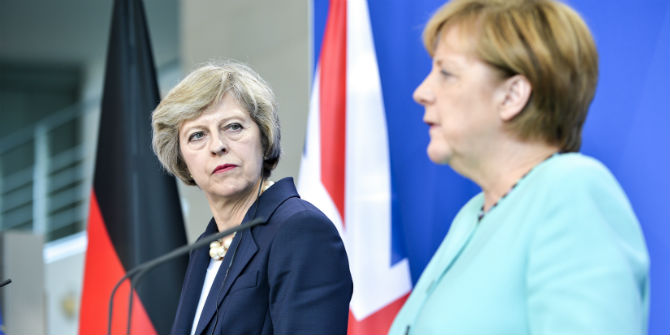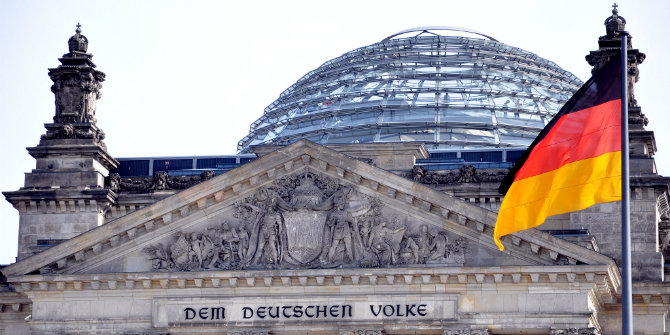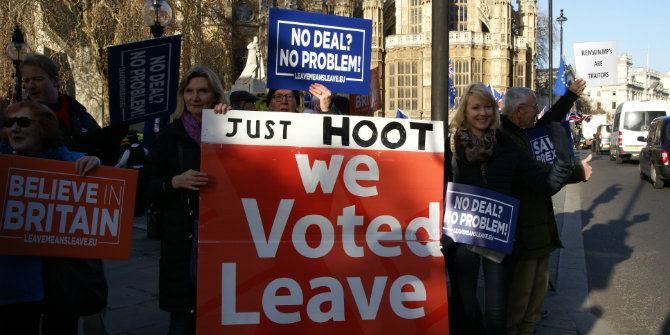 At her meetings in Brussels this week, Theresa May and the European Commission agreed to ‘accelerate’ the stalled Brexit negotiations. But, as John Ryan writes, after a bruising election result, Angela Merkel will be preoccupied with coalition talks until Christmas. The UK should not expect major concessions from Germany, which knows its principal interest is in preserving the Single Market.
At her meetings in Brussels this week, Theresa May and the European Commission agreed to ‘accelerate’ the stalled Brexit negotiations. But, as John Ryan writes, after a bruising election result, Angela Merkel will be preoccupied with coalition talks until Christmas. The UK should not expect major concessions from Germany, which knows its principal interest is in preserving the Single Market.
The German election result means there will be coalition talks until December between Chancellor Angela Merkel’s Christian Democrats CDU/CSU and the Free Democratic (FDP) and the Green party. This means that Germany may have a new coalition government in January 2018, and makes the political climate in which any Brexit negotiations are taking place more uncertain.
FDP leader Christian Lindner has warned against punishing the UK during Brexit negotiations. Germany has ‘an interest in a strong and economically prosperous Great Britain,’ he said in June, adding that a weakened UK would also leave Europe worse off. Michael Theurer, currently an MEP but poised to move into the German parliament as the FDP’s economics chief, even proposed the creation of a special ‘Brexit Cabinet’ to better safeguard German economic interests with Britain during the Brexit negotiations. Describing his own party as ‘very British-minded’ and ‘in favour of free trade and market economics’, Theurer stressed the need for a strong Britain as a partner for both the EU and NATO.

Having the FDP in the German government would also mean a stronger voice in the Brexit negotiations for German industry, the sector that has most to lose from a punitive Brexit deal. While the FDP would have to compromise as junior partner in such a coalition, its Brexit proposals could find favour with the CDU’s own business-friendly wing (and particularly the Bavarian CSU).
For now, though, Merkel, EU governments and institutions are almost bemused by the lack of preparation shown by the UK government. Britain and the EU still appear to be in completely different worlds: the UK only wants to talk about trade deals; the EU about divorce bills, citizens’ rights and the Northern Ireland border. The slower the progress, the tenser the negotiations are going to be. The UK has been accused of being unprepared and not knowing what it wants, the EU of inflexibility and blackmail.
Cooler heads in London and Berlin do not want a ‘hard’ Brexit, which now looks like the more likely outcome. Given the confusion and disagreements about what a final post-Brexit deal with the EU might look like, there has been an increased focus on a potential transitional arrangement. Merkel will want to address these problems once a new coalition government is formed. She will want to provide breathing space for the UK and avoid a damaging Brexit for Germany and the EU. It is essential for the UK and the EU that there is minimal disruption to banking and financial services.
May continues to repeat her Brexit mantras. She tries to project the image of getting on with the job, working to get a good deal, always talking as if the outcome is certain. But it is not certain at all. Her speech in Florence on 22 September has been welcomed as a small step in the right direction, but there remains a lack of detail in areas such as citizens’ rights, and especially Northern Ireland. Close observers think she is making the mistake that sank David Cameron in thinking the negotiations can ultimately be sorted out between politicians.
Hardline Brexiters may be celebrating the sharp increase in support for the right wing Alternative für Deutschland (AfD) party, which has achieved 12.6% and 94 seats in the Bundestag thanks to a protest vote against the influx of refugees and other immigrants since 2015. The AfD is now the third largest party in the German parliament. Nigel Farage was one of those who supported their campaign. But pro-British cries from an opposition party that is reviled by everyone else in the German parliament will scarcely help the UK cause.
Furthermore, it is rather likely that this will be Angela Merkel’s last term as Chancellor—a chance for her to guide Europe through Brexit. It is worth remembering that the EU is in Germany’s core national interest, in terms of the economy, politics and security. For most of the German parties, the EU’s cohesion and stability are incredibly important. For German businesses, with supply chains stretching across the EU, the Single Market is also more important than tariff-free access to the UK market.
German elites and the public are on the same page when it comes to the future relationship between the EU and the UK: that the EU should try to maintain a good relationship with the UK, but that it should not make any compromises on its core principles. There might be a warmer approach to the UK from the FDP but it is unlikely that it will want to spend its bargaining chips in coalition negotiations on Brexit. At the end of the day, the result will not change that much. Merkel understands that the success of the UK and the EU are interlinked, both politically and economically. Her pragmatism will prevail.
Meanwhile, the first signs are emerging of how coalition talks are progressing in Germany. Merkel’s CDU has reached a deal on migrant policy with her conservative Bavarian allies, removing a major obstacle to pursuing talks on a coalition with other parties. In an apparent concession, Merkel agreed to put a number on how many people Germany would accept per year on humanitarian grounds – a net total of around 200,000 individuals. The two parties have formed a parliamentary bloc together for decades, but have diverged over migrant policy since Merkel admitted a huge wave of migrants in 2015, most of whom entered the country through Bavaria. However, setting a number is a climbdown for Merkel and may not be acceptable to the Greens.
Exploratory talks will begin on 18 October, with the CDU/CSU block holding meetings with the FDP and separately with the Green Party. On 19 October, the FDP and the Green Party will get together for bilateral talks, followed by a joint meeting of all four parties. While criticism by the FDP and the Green Party of the CDU/CSU’s “soft cap” proposal is likely to dominate the early debate, the parties also disagree profoundly on larger issues including Eurozone reform, environmental protection, and the automobile industry.
The SPD has just achieved a strong result in a regional election in Lower Saxony with 39.9%, a gain of 4.3%. This is good news for party chairman Martin Schulz, reversing a trend of three lost elections at state level – Saarland in March, Schleswig-Holstein and North Rhine-Westphalia in May and the federal election this September, which saw the SPD suffer its worst result since 1949 and which was a humiliation for Schulz.
The result in Lower Saxony also saw the AfD enter another state parliament with 6.2%, while the CDU, FDP and Greens all lost ground. With this latest election out of the way, we will now see the actual start of German coalition negotiations.
For Merkel, this means that issues other than Brexit will be her priority over the next ten weeks. The UK government should therefore not rely too much on being able to gain support for its demands. Once the new German coalition government is formed, May and her team of Brexit negotiators may be looking for renewed momentum, but it is worth remembering that Merkel’s political interest in keeping the EU-27 together outweighs any interest the German car industry or any other industry has in the British market.
This week May and the president of the European Commission, Jean-Claude Juncker, agreed that Article 50 negotiations should accelerate over the months to come. But the PM failed to convince the EU to start talks about the transition period, because of the lack of substantial progress on the divorce bill, citizens’ rights and the Irish border. Behind the scenes Germany is taking a hard line on these issues.
Please read our comments policy before commenting.
Note: This article originally appeared at our sister site, LSE Brexit. It gives the views of the author, not the position of EUROPP – European Politics and Policy or the London School of Economics.
_________________________________
 John Ryan – LSE IDEAS
John Ryan – LSE IDEAS
Professor John Ryan is a Fellow at LSE IDEAS (International Strategy and Diplomacy). He was previously a fellow at St Edmund’s College, University of Cambridge, and at the European Integration section of the German Institute for International and Security Affairs, Berlin, Germany.






This issue can be dressed up however people choose to do so but the bottom line is that the only thing that truly matters to the EU, Germany included, is how much money the EU can extort from Britain before we leave. Germany has already said it will not increase its contributions to offset the loss of Britains funds and those countries who are the main beneficiaries have said they will not countenance any reductions in their funding. In short this is all about money and the aim of Germany and France, the countries which benefit most from the single market and ever closer union, is to get as much money from Britain as possible before we leave, which buys them time.
Yes, the EU will miss UK budget contributions but the UK will miss the advantages of membership. Both parties lose..
In respect to the UK net budget contribution, it’s about 8 billion a year (the NHS costs 120 billion) . The size of the EU means that 8 billion is not devastating for the EU. Leaving the Single Market without a very long transitional stage, will be devastating for the UK economy..However Brexits are anxious that a long transitional phase will allow people to be better aware of the advantages of membership ( and for older more pro Brexit voters to be replaced by younger pro EU voters coming of age). As such, they would rather a hard Brexit whatever the consequences for the economy..
The EU is not a charity and the seed money distributed to the periphery is given for selfish purposes of the giving nations. It may not make much sense from the UK perspective due to such low exports at present.
However, as the UK leaves, there prospect to profit from the economic growth in the EU periphery ends.
Germany does benefit from the integrated manufacturing chans across the Channel. Just think Airbus, BMW.
However ther is not going to be any new investment in the next five years.
The return is too uncertain.
In addition, the present migration of banks from london to Frankfurt does not put any time pressure on Berlin.
The EU can just watch the internal wars in London until the Brexit bill is passed. No external aggression.
The debate is conducted in the British parliament, where it belongs imho.
It might have been less scary, if it had taken place decades earlier. Bettre late than never.
In another article on this site talking about why people change their minds in a second referendum it is stated that if smaller countries reject the EU it is not a big deal but if France did that would be it, the end of the EU. There is no EU without France. The UK is the EUs second largest contributor. More than France. Yet we are constantly told the EU is fine without us, the UK will be destroyed, no concessions will be made for us. What kind of game is being played here? I suspect the EU and the elites are determined to cow the UK by dragging.g out negotiations, making it difficult.. No-one is allowed to leave, no-one is allowed to say No. Anything not positive about the EU is being tagged as populist,far right, xenophobic, stupid, disastrous, to try and deflect any criticism or any dissent. Cooperation between nation states is considered impossible without being part of the bloc. The USSR failed. The EU is taking its place. i actually voted Remain in the referendum but since then I have changed my mind. Some things are more important. The United States of Europe is not what the British people want. And it should be ok to not want that. If it’s OK for Scotland or Catalonia to want their independence from a bigger union then it should be ok for the UK too. What kind of club is ‘impossible’ to leave? Why is the wording of article 50 so vague? Because it was not expected to ever be used. Once you’re in you’re in, there is no changing your mind and the direction the EU takes will be more and more decided by people like Juncker, whether we like it or not. Democracy is truly dead.
Cherly: There could never be a USE with the UK as our Parliament is supreme and can, could, and now has voted to leave the EU. That’s unlike the USA where a civil war was fought to impose the principal that once in, you can’t leave.
As for comparing the EU to the USSR? The ” members” did not agree to join and their retention in the USSR was sustained by brutal repression, including the use of Gulags and ethnic cleansing..
The EU is a lose confederation. The EU could not stop the UK invading Iraq or interferring in Libya ( despite the problems for the EU such UK ( and French) behavior has caused the EU in respect to an unprecedented flood of refugees and migrants. The EU had not invaded us for leaving…with all our opt outs we were already a semi detached member who was having our cake and eating it. With a permeant opt out from the Euro we would have ( if we stayed) become further detached as the Eurozone further intergrated.